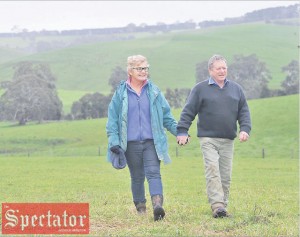REX MARTINICH
The Hamilton Spectator – August 08, 2015
A SENATE committee’s call for a new federally-controlled wind energy regulatory regime has been described as “misguided” and “baseless” by the Victorian Government.
The Victorian opposition has backed the committee’s call that “local councils should retain development approval decision-making”.
The Senate Select Committee on Wind Farms this week handed down 15 recommendations, inducing a call for wind energy subsidies to be slashed from 20 years to five.
The majority of the report’s authors want to establish an ‘Independent Expert Scientific Committee on Industrial Sound’ to provide advice on wind farm developments and commission research.
The report calls for State Governments to be excluded from receiving renewable energy certificates if they reject new federal guidelines on proposed wind farm developments.
If the report’s recommendations were implemented in full, existing wind farms could also face sanctions for breaching any new wind energy regulations on noise, infrasound or other impacts on humans and the environment.
Labor Senators produced a dissenting report that labelled the call for more regulation “enormously expensive, duplicative and unworkable” and accused the Australian Government of a campaign to “hamper the expansion of renewable energy generation in Australia”.
“Labor Senators reiterate their strong support for the wind energy industry in Australia,” the dissenting report stated.
Liberal Democrat Senator David Leyonhjelm, who sat on the wind farm committee, criticised Wannon Federal MP Tehan’s support of wind farm jobs and investment on Sky News this week,
Senator Leyjonhelm said Mr Tehan had made an “assumption” that “if you don’t have wind energy, you don’t have renewable energy”.
“There are plenty of jobs from solar, biomass and geothermal and those sorts of things,” he said.
Mr Tehan did not respond to a request to comment before publication deadline.
Western Victoria State Labor MP Gayle Tierney dismissed the call for a greater regulatory regime on wind farms.
“These recommendations, along with the majority of recommendations in the report are misguided and founded on baseless theories,” she said.
“The report simply attacks the wind industry, including the current and future jobs it provides for Victoria.”
Victorian shadow energy minister David Southwick, who toured south-west Victoria earlier this year in support of wind farm jobs and investment, called for a “balanced” approach.
“The Victorian Coalition is committed to providing an affordable and reliable renewable energy sector that delivers jobs and investment for Victoria,” he said.
“Wind is a key component for Victoria’s energy mix, but must be balanced with community consultation to protect amenity and environmental value of our communities.
“(Premier) Daniel Andrews has ripped away local input into planning decisions on wind farms from local councils which are now purely at the discretion of the Planning Minister in Spring Street.”
Cape Bridgewater landowner Sonia Trist, who lives near a wind farm and blames the turbine noise for her health problems, told The Portland Observer that she hoped the Australian Government would adopt the recommendations.
Macarthur landowner Annie Gardner appeared on Alan Jones’s TV program on Sky News this week and gave her support for the recommendations.
She blamed the neighbouring AGL Macarthur wind farm’s construction for the decline of her fine wool growing business and the turbines for her family’s headaches and heartburn.
“We didn’t know anything about infrasound and we didn’t get a great deal of background noise but the infrasound is there 24/7; all day and all night our home is toxic,” she said.
